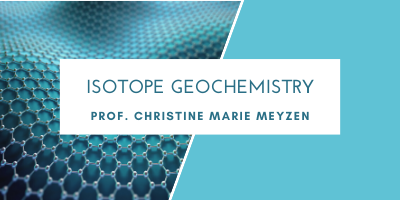Isotope Geochemistry

Period: second semester
Course unit contents:
This course provides a rigorous introduction to the principles and applications of isotope geochemistry. It begins with an in-depth examination of nuclear stability and the physical processes governing radioactive decay. The origin of both stable and radioactive nuclides is explored through the study of nucleosynthetic pathways in cosmological and stellar environments. The foundations of stable isotope geochemistry are then presented, with particular emphasis on their application in cosmochemistry, geothermometry, hydrology, and paleoclimatology. This is followed by a detailed analysis of radiogenic isotope systems, including the major long-lived systems (Rb-Sr, Sm-Nd, Lu-Hf, U-Th-Pb) and extinct radionuclides. Applications as chronometers or tracers are focused on a wide range of topics ranging from processes and timescales relevant to the formation of the planet and solar system, the evolution of the Earth system to environmental issues. The course combines lecture-based instruction with hands-on problem-solving sessions designed to deepen conceptual understanding and develop advanced analytical and interpretive skills relevant to modern isotope geochemistry.
DETAILED COURSE CONTENT:
1. Introduction
2. Atoms and nuclei: their physics and stability
3. Radioactivity
4. Nucleosynthesis: when, where and how chemical elements are formed?
5. Principles of stable isotope geochemistry
6. Tracing the hydrologic cycle with O and H isotopes
7. Law of radioactive decay and geochronometry
8. The Rb-Sr isotope method and its applications
9. The Sm-Nd isotope method and its applications
10. The Lu-Hf isotope method and its applications
11. The U-Pb, Th-Pb and Pb-Pb isotope methods and its applications
Planned learning activities and teaching methods:
The course combines lecture-based instruction with supervised practical activities. Lectures are designed not only to deliver core content but also to encourage discussion and critical engagement with the topics. The practical component includes problem-solving exercises, problem-based learning, interactive quizzes, and peer assessment. Problem-solving involves identifying, analyzing, and resolving issues, fostering students’ critical thinking and creativity. Problem-based learning is a student-centered approach in which learning is driven by the analysis of real-world problems, serving as a foundation for acquiring new knowledge. Quizzes are used to assess students' understanding of key concepts throughout the course. The use of artificial intelligence tools is encouraged as a means to stimulate critical thinking and support independent learning. To further enrich the learning experience and provide hands-on exposure, students will also participate in activities such as a laboratory visit.
Students with specific learning disorders (SLD) or other conditions (including physical health, which may prevent full fruition of the module) are encouraged to contact the Student Service office (“Ufficio Servizi agli studenti - Settore Inclusione”), which can provide further information, support and learning tools.
